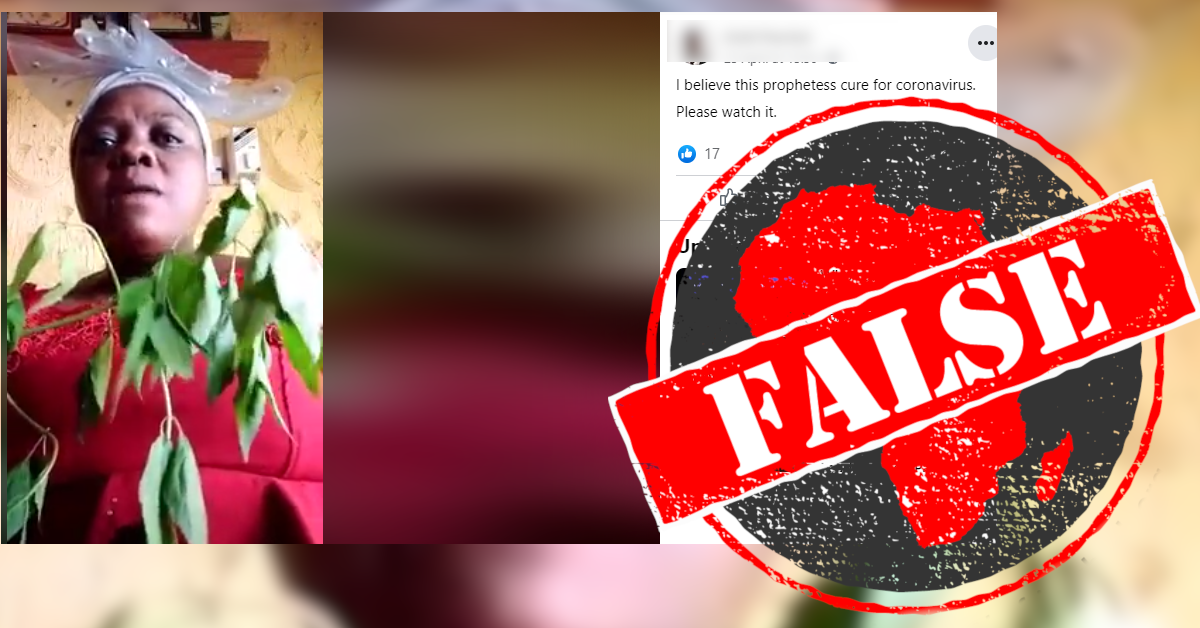A viral video shows a Nigerian woman, who introduces herself as “prophetess Dupe Oluwaniyi”, saying Siam weed, or Chromolaena odorata, is the cure for the novel coronavirus.
In the video, which has circulated on WhatsApp and Facebook, Oluwaniyi says she received the information by divine inspiration after praying about the Covid-19 pandemic.
“It is the remedy to cure coronavirus. Share, let everybody know. You can find it anywhere that is very near to you. Nobody is asking you for money. Let everybody know that this is the cure for coronavirus and look for it. Let them search it, let it go viral,” she says.
The woman says the weed should be squeezed to extract a liquid to be drunk as a remedy, or boiled and drunk warm, like tea.

It is absolutely wrong to claim that any substance can cure any disease without rigorous scientific testing, Marycelin Baba, a professor of medical virology and microbiology at the University of Maiduguri, northeastern Nigeria, told Africa Check.
“The question to ask is: ‘Where is the scientific evidence?’ There is a long process the Siam weed needs to go through before it [can be] accepted as a cure. That process includes pre-clinical trials and clinical trials,” Baba said.
As of 6 May 2020, the Nigeria Centre for Disease Control had recorded over 3,145 confirmed Covid-19 cases and 103 deaths. According to the World Health Organization, there is still no cure for the disease.
“While some western, traditional or home remedies may provide comfort and alleviate symptoms of Covid-19, there is no evidence that current medicine can prevent or cure the disease,” the WHO says.
It notes that there are several ongoing clinical trials that include both western and traditional medicines, and promises to provide updates as soon as clinical findings are available. – Allwell Okpi
In the video, which has circulated on WhatsApp and Facebook, Oluwaniyi says she received the information by divine inspiration after praying about the Covid-19 pandemic.
“It is the remedy to cure coronavirus. Share, let everybody know. You can find it anywhere that is very near to you. Nobody is asking you for money. Let everybody know that this is the cure for coronavirus and look for it. Let them search it, let it go viral,” she says.
The woman says the weed should be squeezed to extract a liquid to be drunk as a remedy, or boiled and drunk warm, like tea.

‘Where is the scientific evidence?’
It is absolutely wrong to claim that any substance can cure any disease without rigorous scientific testing, Marycelin Baba, a professor of medical virology and microbiology at the University of Maiduguri, northeastern Nigeria, told Africa Check.
“The question to ask is: ‘Where is the scientific evidence?’ There is a long process the Siam weed needs to go through before it [can be] accepted as a cure. That process includes pre-clinical trials and clinical trials,” Baba said.
Still no cure
As of 6 May 2020, the Nigeria Centre for Disease Control had recorded over 3,145 confirmed Covid-19 cases and 103 deaths. According to the World Health Organization, there is still no cure for the disease.
“While some western, traditional or home remedies may provide comfort and alleviate symptoms of Covid-19, there is no evidence that current medicine can prevent or cure the disease,” the WHO says.
It notes that there are several ongoing clinical trials that include both western and traditional medicines, and promises to provide updates as soon as clinical findings are available. – Allwell Okpi
Republish our content for free
For publishers: what to do if your post is rated false
A fact-checker has rated your Facebook or Instagram post as “false”, “altered”, “partly false” or “missing context”. This could have serious consequences. What do you do?
Click on our guide for the steps you should follow.
Publishers guideAfrica Check teams up with Facebook
Africa Check is a partner in Meta's third-party fact-checking programme to help stop the spread of false information on social media.
The content we rate as “false” will be downgraded on Facebook and Instagram. This means fewer people will see it.
You can also help identify false information on Facebook. This guide explains how.





Add new comment